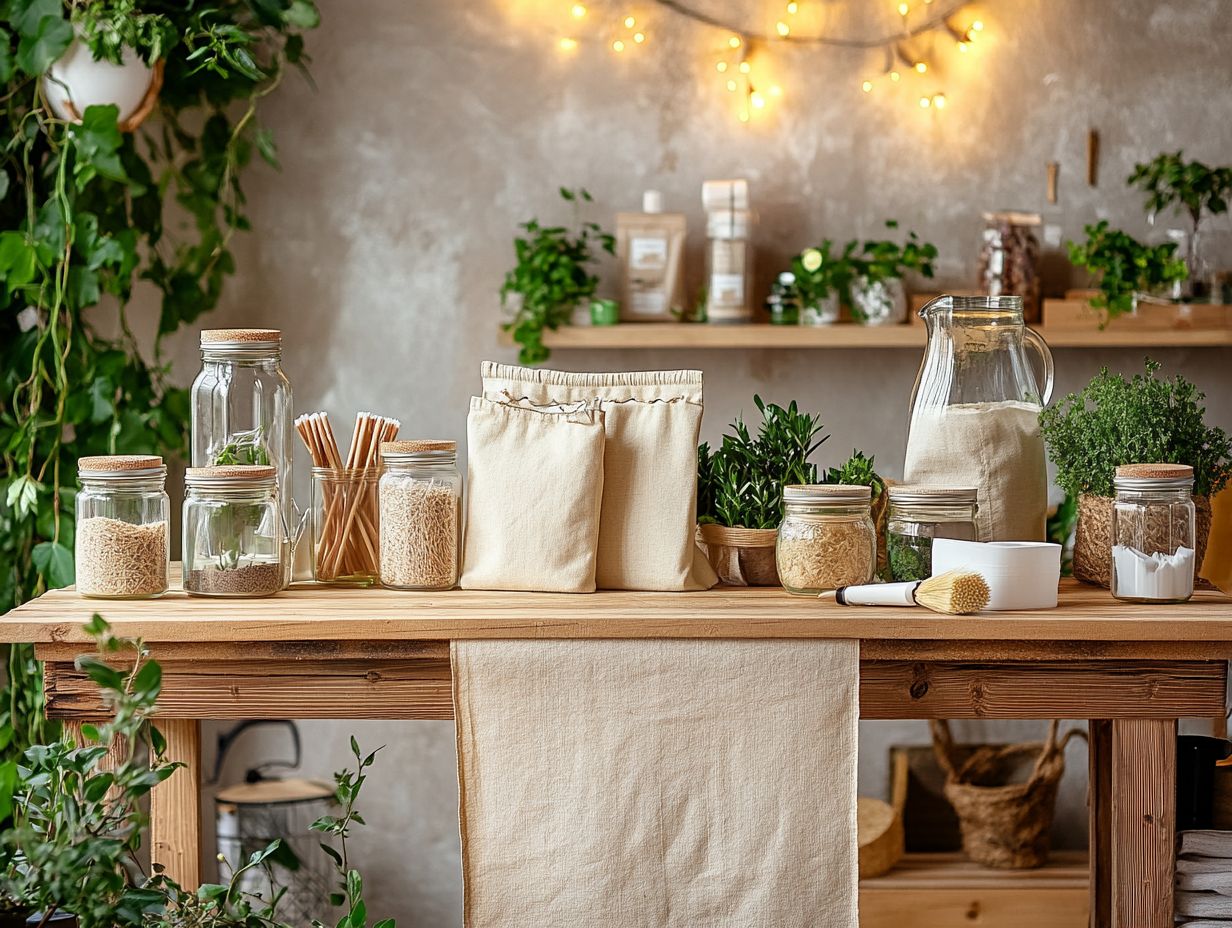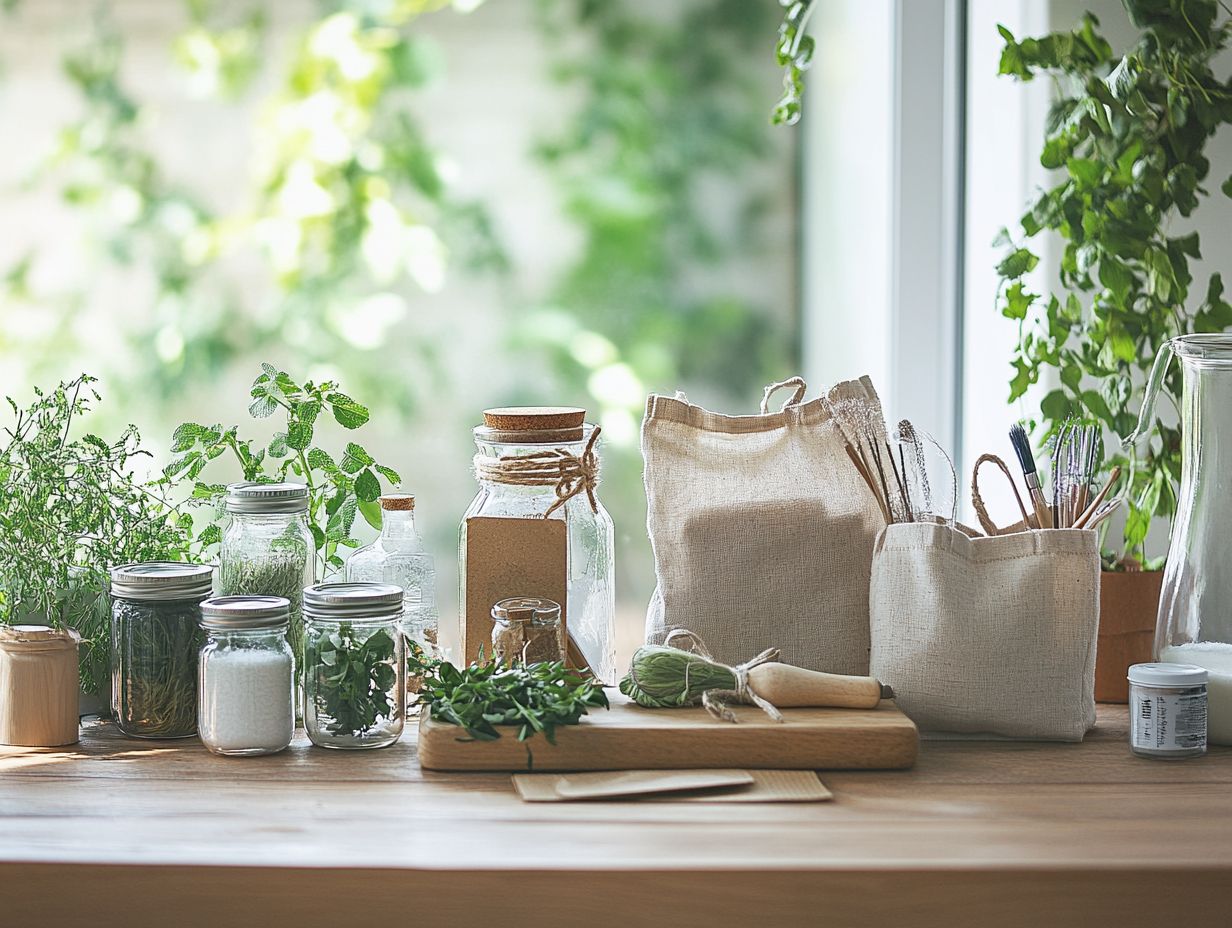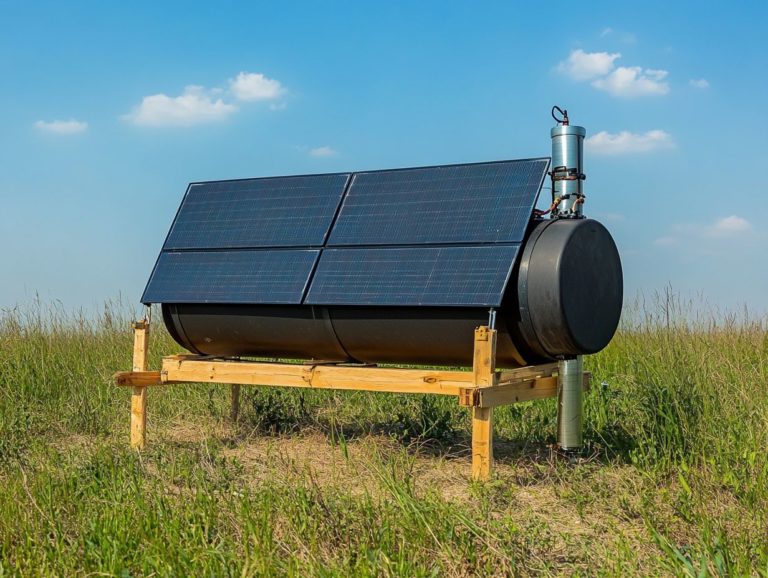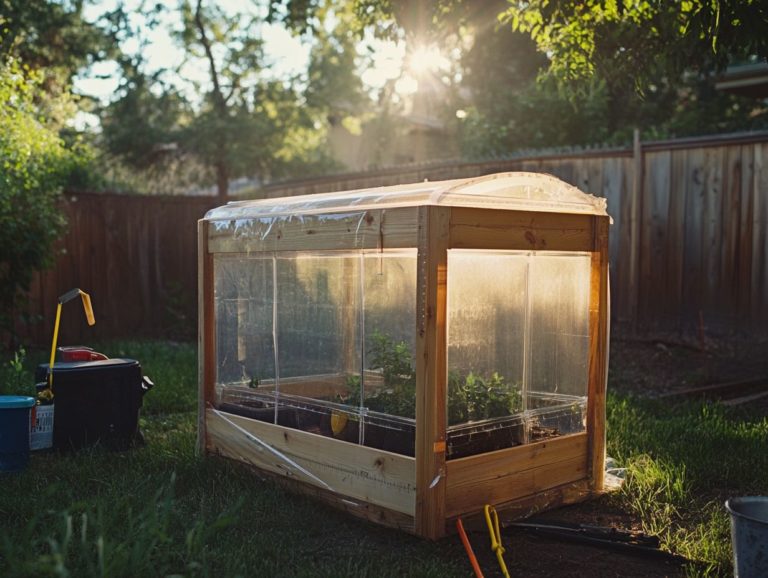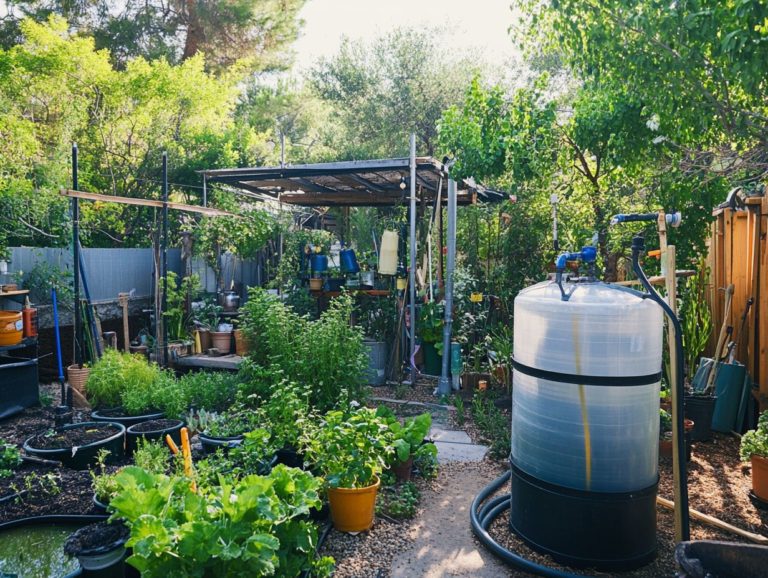10 Essential DIY Items for Sustainable Living
In a time when environmental awareness holds unprecedented significance, you may find the prospect of adopting a sustainable lifestyle somewhat daunting. However, it s essential to remember that even small changes, like integrating sustainable alternatives and making eco-friendly choices, can lead to substantial impacts.
This brings to light ten indispensable DIY items that not only aid in waste reduction but also foster a more eco-friendly daily routine. From reusable water bottles to compost bins, each item plays a pivotal role in your journey toward sustainability and reducing your carbon footprint.
Discover how these practical tools, including DIY projects like creating beeswax wraps and using silicone bags, can streamline your life while simultaneously benefiting the planet.
Consider incorporating sustainable practices throughout your home improvement projects, such as using non-toxic paint, installing energy-efficient window shades, setting up a home office with eco-friendly products, and investing in a heat pump dryer and water filter from brands like Miele and Sub-Zero. These choices can greatly contribute to a zero-waste lifestyle.
Contents
- Key Takeaways:
- 1. Reusable Water Bottles
- 2. Cloth Shopping Bags
- 3. Reusable Food Containers
- 4. Compost Bin
- 5. Rechargeable Batteries
- 6. Solar-Powered Lights
- 7. DIY Cleaning Products
- 8. Cloth Napkins
- 9. Mason Jars
- 10. Reusable Straws
- How Can These Items Help Reduce Waste and Promote Sustainability?
- Frequently Asked Questions
- What are 10 essential DIY items for sustainable living?
- How can reusable water bottles help in sustainable living?
- Why is a compost bin important for sustainable living?
- What is the benefit of using rain barrels in sustainable living?
- How do solar-powered lights contribute to sustainable living?
- What can be done with mason jars in sustainable living?
Key Takeaways:
1. Reusable Water Bottles
Choosing reusable water bottles is a pivotal step toward embracing a more sustainable and eco-friendly lifestyle. By significantly reducing plastic waste, you empower yourself to make conscious choices about your consumption habits. When you opt for a reusable bottle, you’re not just minimizing your carbon footprint; you re also making a positive impact on the environment, aligning with the ideals championed by visionaries like Minted Space and interior designers like Sarit Marcus, who advocate for sustainable living practices in Tampa and beyond.
Typically crafted from durable materials such as stainless steel, glass, or BPA-free plastic, these bottles are designed for repeated use, lessening your reliance on single-use plastics. Hydration is essential to your overall health, and more individuals are starting to recognize that opting for sustainable choices can seamlessly integrate into their daily wellness routines, including energy-efficient habits like reducing energy usage and choosing non-toxic paint for better indoor air quality.
It s staggering to realize that approximately 300 million tons of plastic are produced each year, with around 8 million tons finding their way into oceans and wreaking havoc on marine life and ecosystems. This underscores the importance of adopting zero-waste practices and choosing reusable products.
Brands like Hydro Flask and S’well not only champion the use of reusable bottles but also commit a portion of their profits to advancing environmental initiatives. According to a study by the Plastic Pollution Coalition and a Meta study, transitioning to reusable products can reduce plastic waste by at least 80%.
So, with every sip from your reusable water bottle, you’re not just quenching your thirst; you re actively participating in a broader movement toward sustainability and supporting efforts to reduce indoor air pollution.
2. Cloth Shopping Bags
Cloth shopping bags are not just a stylish accessory; they re a smart choice for minimizing waste and championing sustainability, making them a top pick for eco-conscious shoppers like you. With brands such as IKEA and The Good Boutique leading the charge, these reusable bags are essential for eliminating single-use plastics and nurturing a culture of eco-friendly shopping that benefits our planet.
You ll find a variety of cloth bags made from materials like cotton, jute, and recycled polyester, each offering distinct advantages in durability and strength that easily surpass traditional plastic bags. By integrating these sturdy alternatives into your shopping routine, you make a significant impact on waste reduction and indoor air quality, as they can handle multiple shopping trips without showing signs of wear.
Many retailers are now on board with eco-friendly initiatives, encouraging you to opt for reusable bags by offering discounts when you bring your own. This not only fosters sustainable habits but can also lead to significant savings for you over time, underlining the importance of making environmentally conscious choices in your everyday life. Consider supporting stores like The Good Boutique and EcoLunchbox, which prioritize sustainability.
3. Reusable Food Containers
Reusable food containers are essential in cultivating an eco-conscious lifestyle by offering efficient storage solutions that significantly cut down on food waste and promote sustainability. Opting for these containers means you re choosing non-toxic materials that are safe for both your health and the environment, perfectly aligning with the principles of waste reduction and sustainable practices. Using silicone bags and beeswax wraps can further enhance your food storage strategy.
You ll find a variety of materials such as stainless steel, glass, and BPA-free plastics, each with its unique benefits. Stainless steel boasts incredible durability for long-term use, while glass provides a non-reactive surface that won t leach harmful chemicals into your food.
Embracing meal prepping gives you the power to plan your meals ahead of time, saving you valuable time, managing portion sizes, and minimizing the risk of food spoilage. This practice can seamlessly integrate with sustainable living by using eco-friendly products and sustainable DIY solutions.
To further reduce waste in your home, consider implementing simple strategies like:
- Using up leftovers
- Composting
- Purchasing from eco-conscious brands like EcoLunchbox and Stasher, which prioritize environmentally friendly materials in their products, and using a whole home dehumidifier to maintain optimal moisture levels.
4. Compost Bin
A compost bin is an invaluable asset for anyone like you who is eager to adopt an eco-conscious lifestyle while making a significant impact on waste reduction. By composting organic waste, you not only prevent materials from ending up in landfills, but you also enrich your garden soil. It s a sustainable practice that truly benefits both the environment and your home, as highlighted by experts like Andrew Pace from The Green Design Center.
There are various types of compost bins available to meet your specific needs, ranging from compact kitchen models perfect for small spaces to larger outdoor setups for those with a bit more room to work with. Brands like Solace Air RS4 offer solutions that can fit various home environments.
Starting your composting journey at home can be remarkably straightforward. Just gather kitchen scraps like fruit peels and coffee grounds, and combine them with yard waste such as grass clippings and leaves. You can also enhance your compost with organic compounds to speed up the decomposition process.
The benefits of composting extend far beyond just improving your soil; it also helps reduce greenhouse gas emissions and minimizes your reliance on chemical fertilizers, promoting greater sustainability in your household. According to the U.S. Green Building Council, composting is a key component of sustainable living.
To keep your compost bin in top shape, make it a habit to regularly turn the materials to aerate the mixture and add water to maintain a moist, but not soggy, consistency.
Be mindful of common composting mistakes, such as adding meat or dairy, which can attract unwanted pests. Sticking to plant-based scraps is a much safer and more effective approach.
5. Rechargeable Batteries
Choosing rechargeable batteries is an impactful step you can take toward sustainability and waste reduction. It’s an eco-friendly alternative to single-use batteries, which can wreak havoc on the environment. By making the switch to rechargeable options, you can significantly lower your energy consumption and carbon footprint while enjoying the convenience of long-lasting power. Consider using an air purifier to further improve the sustainability of your home environment.
Beyond the environmental advantages, using rechargeable batteries also means significant cost savings over time. Although the initial investment might be higher, the ability to recharge these batteries multiple times leads to reduced expenses in the long run. By ensuring proper usage like avoiding extreme temperatures and using energy-efficient devices you can further extend their lifespan.
In terms of disposal, following the correct recycling protocols is essential. This allows your old batteries to be transformed into new products instead of ending up in a landfill. Not only does this conserve resources, but it also contributes to a more sustainable future and aligns with the goals of the U.S. Green Building Council.
6. Solar-Powered Lights
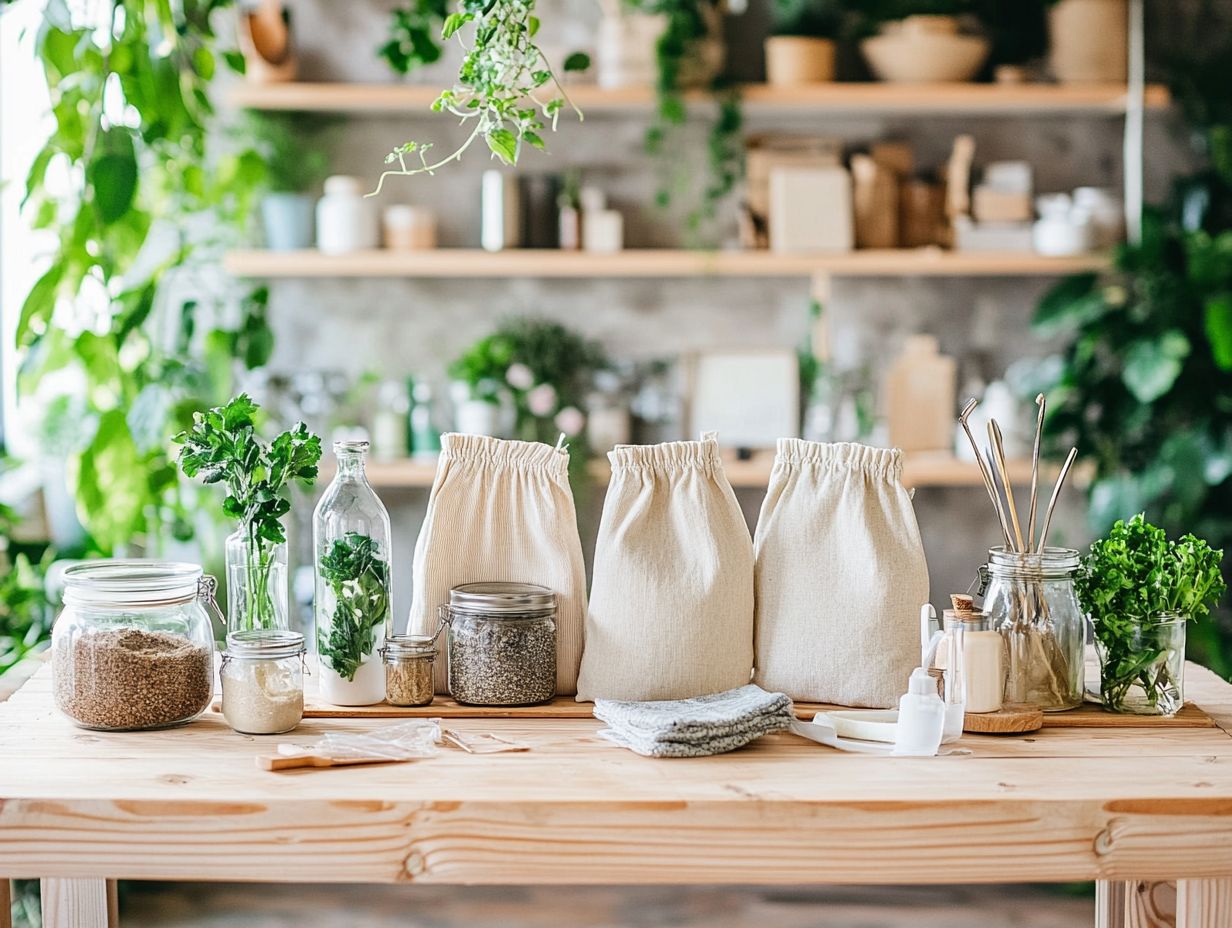
Solar-powered lights embody a remarkable blend of technology and sustainability, offering you an eco-friendly lighting solution that significantly slashes energy consumption. By harnessing the sun’s power, these lights not only help you minimize your carbon footprint but also encourage a greener lifestyle while enhancing the aesthetics of your outdoor spaces. Consider pairing them with sustainable interior decor like vintage furniture to maximize your home’s eco-friendliness.
You ll find a variety of options available, including:
- pathway lights
- motion-sensor floodlights
- decorative string lights
Each option is tailored to meet your specific needs and preferences.
While the initial investment may be higher compared to traditional lighting, consider the long-term savings you ll enjoy on electricity bills and the minimal maintenance costs. This makes solar-powered lights an appealing choice for homeowners like yourself.
By utilizing renewable energy sources, you can revel in reliable illumination without the environmental guilt that comes with conventional energy consumption. This promotes a sustainable future where practical applications such as lighting up your garden or driveway seamlessly integrate into your everyday life. Solar-powered solutions are especially beneficial in reducing energy consumption from vampire appliances.
7. DIY Cleaning Products
Creating your own DIY cleaning products is a sustainable choice that empowers you to control the ingredients while significantly minimizing the environmental impact associated with commercial cleaning solutions. By opting for non-toxic and eco-friendly components, you enhance the quality of your indoor air and contribute to a healthier home environment. Consider using organic compounds and essential oils for an added touch of aromatherapy.
Switching to homemade cleaning solutions can also save you a considerable amount of money over time, as basic ingredients like vinegar, baking soda, and essential oils are often more budget-friendly than their commercial counterparts. Embracing these recipes helps lessen your reliance on single-use plastics frequently found in store-bought products, ultimately reducing waste in landfills and oceans. Additionally, using eco-friendly cleaning products can reduce your home’s indoor air pollution caused by commercial chemical cleaners.
By educating yourself on simple recipes for everyday cleaning tasks, you not only give the power to yourself to make healthier choices for your family but also cultivate a sustainable lifestyle that benefits the planet. In this way, you can actively participate in creating a positive impact while keeping your home clean and safe. Even incorporating aromatherapy diffusers can enhance the air quality with organic compounds from essential oils.
8. Cloth Napkins
Cloth napkins present an elegant and sustainable alternative to disposable paper products, allowing you to embrace an eco-friendly lifestyle while significantly cutting down on waste. By incorporating cloth napkins into your daily routines, you not only enhance your dining experience but also contribute to a broader movement focused on sustainability and waste reduction.
These reusable accessories add a touch of sophistication to any table setting and are remarkably durable, offering a longevity that paper napkins simply cannot match. They are easy to maintain, as they can be tossed in the wash and used countless times, making them a smart economical choice over time.
To seamlessly integrate them into your everyday life, consider keeping a stack of these versatile napkins by the dining table for casual meals or using patterned cloths to elevate special occasions. This simple shift not only makes a stylish statement but also highlights your commitment to a greener lifestyle.
9. Mason Jars
Mason jars have emerged as a hallmark of sustainability and creativity, offering you versatile storage solutions that champion an eco-friendly lifestyle. Their remarkable ability to be reused for countless purposes ranging from food storage to DIY crafts ensures they remain essential in the homes of those like you who are dedicated to reducing waste and adopting sustainable practices. You can even use them as part of your eco-friendly home office setup to keep stationery organized.
These jars are ideal for storing bulk items such as grains, pasta, and spices, keeping them fresh while significantly cutting down on plastic waste. Beyond their practical applications, they can also enhance your organization; a collection of jars can transform a cluttered kitchen into a visually stunning display. Moreover, they can be paired with non-toxic paint to create customized labels, aligning with sustainable practices.
For the creative soul, mason jars can be turned into charming home d cor pieces, whether as candle holders or planters. By incorporating these containers into your daily routine, you take a simple yet impactful step toward sustainability, allowing you to reduce your carbon footprint while enjoying the benefits of repurposing both functional and aesthetically pleasing items. Consider engaging in sustainable crafts by using recycled materials in your DIY projects.
10. Reusable Straws
Reusable straws may seem like a small choice, but they wield significant power in reducing plastic waste and paving the way for a more sustainable future. By making this switch, you play a part in diminishing single-use plastic consumption. With options available in materials such as stainless steel, silicone, and bamboo, these eco-friendly alternatives not only align with an eco-conscious lifestyle but also elevate your drinking experience. For instance, silicone bags can be used alongside reusable straws for a completely waste-free lunch.
When you choose these straws, you can savor your beverages without the nagging guilt of contributing to the millions of plastic pieces that find their way into oceans and landfills each year. Each type of reusable straw brings its own unique advantages. Opt for a water filter to complement your reusable straws, ensuring that you consume clean, filtered water each time.
- Stainless steel straws are robust and ideal for both hot and cold beverages,
- while silicone straws offer flexibility and are gentle on your teeth.
- Bamboo straws, in contrast, provide a biodegradable option that adds a touch of natural elegance to any drink.
Keeping these straws in top shape is a breeze; many are dishwasher-safe or can be easily cleaned with a simple brush. As the movement toward sustainable dining continues to gain traction, embracing reusable straws not only mirrors your values but also encourages those around you to make environmentally conscious choices.
How Can These Items Help Reduce Waste and Promote Sustainability?
Incorporating reusable items into your daily life not only helps reduce waste but also cultivates a culture of sustainability that can leave a lasting impact on the environment. By transitioning from single-use products to eco-friendly alternatives, you actively participate in a collective movement toward a more sustainable future, leading to notable decreases in carbon footprints and waste. Examples include using a solar-powered whole home dehumidifier to cut down on energy consumption and reduce your environmental impact.
For example, when you choose a stainless steel water bottle over disposable plastic, you can save an estimated 167 plastic bottles each year. Imagine the difference when entire communities adopt this practice millions of bottles could be kept out of landfills. Similarly, using energy-efficient appliances like an induction cooktop can dramatically reduce your household energy usage.
Research indicates that a single reusable bag can substitute for over 700 plastic bags throughout its lifetime, significantly mitigating pollution and protecting marine life. Communities can facilitate this shift by organizing workshops that showcase the benefits of reusable items or by launching programs that incentivize individuals to exchange single-use products for sustainable alternatives. This approach creates a ripple effect, encouraging broader participation in eco-friendly practices. To engage younger generations, consider incorporating fun DIY projects for eco-conscious kids and inviting well-known eco-conscious influencers like Sarit Marcus and Andrew Pace to these workshops for greater impact.
What Are Some Other Essential Items for Sustainable Living?
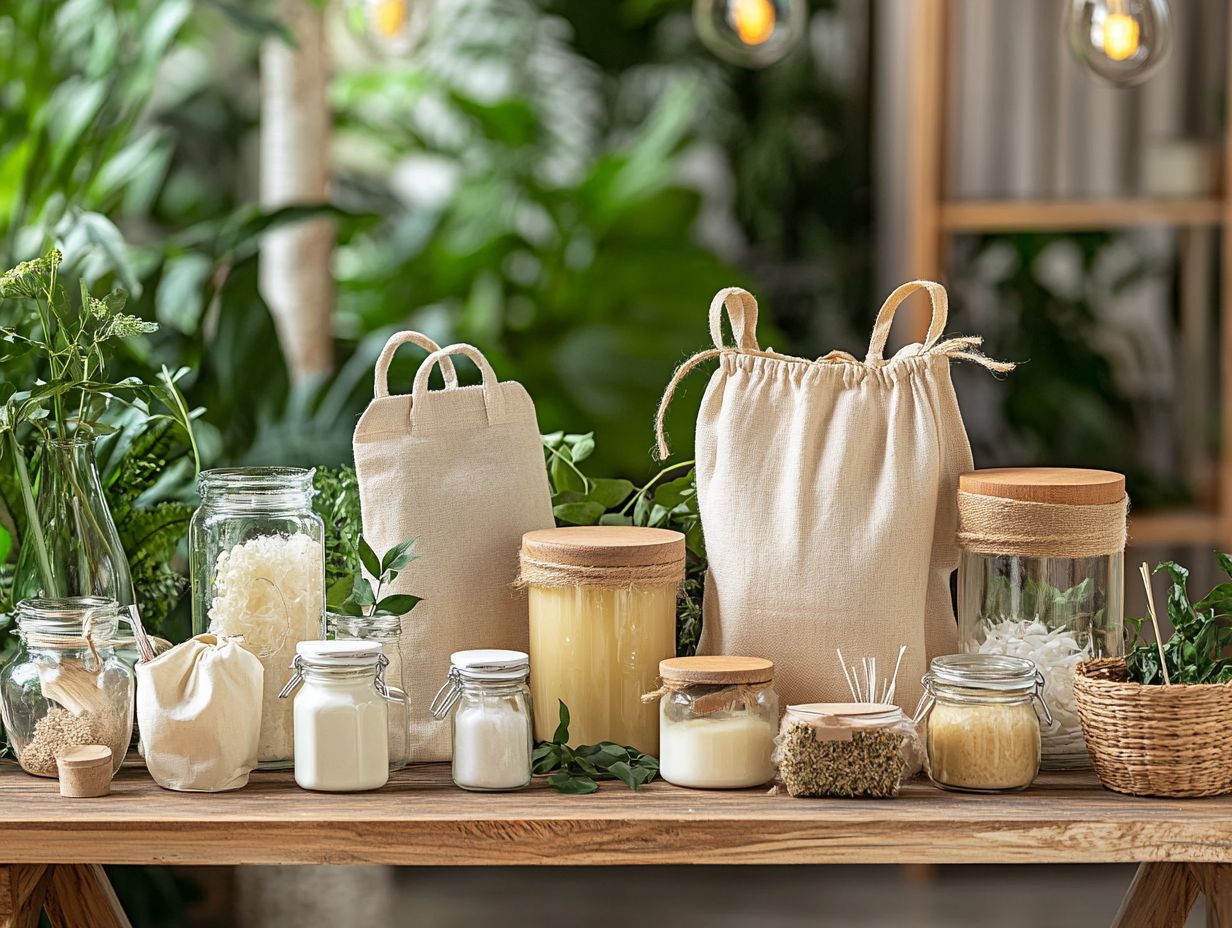
Beyond what has already been discussed, you can explore a range of essential products that will elevate your commitment to sustainable living, promote an eco-friendly lifestyle, and significantly reduce waste. Consider incorporating items like rechargeable batteries, vintage furniture, and eco-friendly cleaning products into your home to create a more sustainable environment. Additionally, using window shades can help regulate indoor temperatures, lowering energy consumption during both summer and winter.
Choosing bamboo toothbrushes over traditional plastic ones is a simple yet impactful switch; bamboo is biodegradable and sustainable, making a noticeable dent in plastic waste. Reusable shopping bags serve not only as a practical solution for carrying groceries but also help minimize the reliance on single-use plastic bags. Additionally, consider implementing 5 simple DIY projects for sustainable energy use to further reduce your environmental impact. Using eco-friendly products from brands like The Good Boutique can also contribute positively to your efforts.
Opting for stainless steel or glass containers for food storage not only avoids the risks of plastic leaching but also ensures durability for repeated use, aligning perfectly with a zero-waste approach. Each of these choices contributes to a comprehensive strategy for sustainable living, collectively reducing waste and fostering a more conscious form of consumerism that aligns with the principles of environmental stewardship. Furthermore, adding an air purifier can improve indoor air quality, enhancing your overall well-being and promoting a healthier home environment.
How Can One Incorporate These Items into Their Daily Routine?
Incorporating sustainable items into your daily routine can be both seamless and rewarding, paving the way for an eco-friendly lifestyle that benefits you and the planet alike. Start by selecting a few key items think reusable bags or water bottles and gradually weave them into your everyday activities to cultivate lasting habits. Consider adding a compost bin in your kitchen to repurpose food scraps and organic waste, contributing to a zero-waste lifestyle.
Consider keeping these reusable products within easy reach; stashing them in your car, handbag, or kitchen makes accessing them a breeze. When you go shopping, having a sturdy tote bag at the ready means you can skip single-use plastics entirely, while a refillable water bottle encourages hydration without the waste of disposable options. If you’re looking to further enhance your sustainable lifestyle, you might want to explore 10 easy DIY home energy efficiency tips or sustainable home improvement projects like installing IKEA recycled materials for your furniture or investing in energy-efficient appliances such as a Miele dishwasher.
Consistency is key here. By making these sustainable choices a regular part of your life, they’ll eventually become second nature. The cumulative effect of these small yet impactful decisions can significantly reduce your environmental footprint and inspire those around you to follow suit, amplifying the positive influence on sustainability in your community. For more ideas, check out 10 budget-friendly DIY energy projects. Consider consulting an interior designer like Wayne Turett or Sarit Marcus for additional tips on creating an eco-friendly home environment.
What Are the Benefits of Using These DIY Items?
Using DIY items presents you with numerous benefits, from cost savings to a heightened awareness of sustainability, giving you the power to take charge of your environmental impact. By crafting eco-friendly cleaning products or reusable storage solutions, you can relish the dual advantages of being resourceful while reducing your dependence on commercial products filled with harmful chemicals. Engaging in sustainable DIY projects like making your own beeswax wrap can also reduce your household waste.
Engaging in DIY projects not only fosters a sense of accomplishment but can also significantly enhance your mental well-being. For example, when you create homemade beeswax wraps as an alternative to plastic wrap, you minimize single-use waste while promoting healthier food storage practices. Additionally, exploring 10 DIY projects to utilize solar energy can help reduce your stress levels, promoting overall mental well-being.
Similarly, crafting natural candles from soy wax can improve your indoor air quality compared to conventional options, all while creating a soothing ambiance. By opting to make your own items, you are contributing to waste reduction and cultivating a more eco-conscious lifestyle, ultimately leading to greater personal satisfaction and a deeper connection with your environment. Additionally, consider the 10 DIY upgrades for an energy-efficient home to further enhance your home’s sustainability.
How Can These Items Save Money in the Long Run?
Investing in reusable items not only champions sustainability but also leads to impressive cost savings over time, making them a wise choice for the eco-conscious consumer. By eliminating the need for single-use products, you can cut down on your spending on disposables while reveling in the durability and longevity of eco-friendly alternatives. For instance, using a heat pump dryer can significantly reduce your energy consumption, saving you money on utility bills.
Take, for instance, the annual expense of purchasing disposable coffee cups. On average, you might spend around $200 each year on coffee cups alone. Now, contrast that with a one-time investment in a high-quality reusable cup, which can start around $20. Over the same period, this choice offers substantial savings. Many coffee shops even reward customers who bring their own cups by offering discounts, further enhancing the financial appeal. Additionally, opting for a reusable cup helps reduce your carbon footprint and supports eco-friendly choices.
As you begin to incorporate various reusable items such as bags, straws, and containers, your cumulative savings can easily reach hundreds of dollars annually. Also, consider switching to silicone bags and beeswax wrap for better food storage. For additional inspiration, check out 5 eco-friendly DIY projects for sustainable living. Thus, by opting for reusable options, you not only reduce waste but also bolster your personal budget, seamlessly aligning sustainability with savvy financial decisions.
What Are Some Tips for Living a More Sustainable Lifestyle?
As an interior designer in Tampa, I recommend using non-toxic paint and vintage furniture to enhance your space sustainably.
Consider incorporating energy-efficient solutions like solar powered systems and window shades to reduce energy consumption and improve your home office environment.
Embracing a more sustainable lifestyle means making a series of deliberate choices that together foster waste reduction and environmental preservation. By integrating eco-friendly habits into your daily routine such as opting for reusable products, cutting down on energy consumption, and supporting sustainable brands, you can create a significant positive impact on the planet. Consider using non-toxic paint and recycled materials for your next DIY project.
But your journey doesn t end with personal changes. It s equally important for you to engage with your community by sharing your knowledge about sustainable practices and participating in local initiatives, like clean-up drives or community gardens. You might also join efforts with organizations like the U.S. Green Building Council to promote environmental impact awareness.
Understanding the effects of your consumption patterns can inspire a collective commitment to reducing waste and protecting natural resources. Engaging in activities like sustainable crafts can also contribute to this effort, including exploring 10 cool DIY projects to reduce energy bills. Remember, even small actions, when embraced collectively, can amplify the positive effects on the environment.
Additionally, cultivating a support network with like-minded individuals will keep your motivation soaring, ensuring that your dedication to sustainability remains a shared priority. Connect with influencers like Andrew Pace or Wayne Turett for more insights and inspiration.
For more tips, follow Minted Space for sustainable home improvement ideas.
Frequently Asked Questions
Explore resources from Sarit Marcus and The Turett Collaborative for expert advice.
What are 10 essential DIY items for sustainable living?
Engaging in sustainable DIY projects can greatly enhance your eco-conscious efforts.
The 10 essential DIY items for sustainable living are: reusable water bottles, cloth grocery bags, compost bin, rain barrel, garden tools, solar-powered lights, homemade cleaning products, reusable food containers, beekeeping supplies, and mason jars for bulk food storage. Additionally, incorporate energy Star rated appliances and essential oils for aromatherapy diffusers. For those looking to enhance their projects, check out these 5 must-have tools for DIY energy projects.
How can reusable water bottles help in sustainable living?
Partnering with brands like Miele and Sub-Zero can also enhance your eco-conscious lifestyle.
Reusable water bottles eliminate the need for single-use plastic bottles, reducing plastic waste and pollution. They also save money and resources by avoiding the constant purchase of disposable water bottles. Using a water filter can further ensure the quality of your drinking water.
Why is a compost bin important for sustainable living?
Leveraging sustainable alternatives like a compost bin can revolutionize your home waste management.
A compost bin allows for the recycling of food scraps and yard waste into nutrient-rich soil for gardening. This reduces the amount of waste that goes into landfills and the need for chemical fertilizers. Utilize organic compounds to further enhance your garden s health.
What is the benefit of using rain barrels in sustainable living?
Rain barrels are a key component of a zero-waste home.
Rain barrels collect and store rainwater, which can be used for watering plants and gardens. This conserves water and reduces the use of treated tap water, which has a high energy cost. Using vintage furniture in your garden setup can also add an eco-friendly touch.
How do solar-powered lights contribute to sustainable living?
Consider a whole home dehumidifier for maintaining comfort.
Solar-powered lights use renewable energy from the sun, reducing the need for electricity generated from non-renewable sources. They also save money on energy bills. Additionally, reduce energy usage from vampire appliances by unplugging devices when not in use.
What can be done with mason jars in sustainable living?
Mason jars contribute to an eco-conscious lifestyle.
Mason jars can be used for bulk food storage, reducing the need for plastic packaging. They can also be used for homemade food preservation, such as canning fruits and vegetables, eliminating the need for store-bought canned goods. Use them in DIY projects to minimize waste further.

